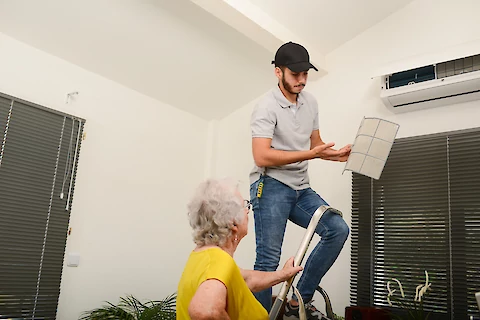
Maintaining a healthy living environment is a key component of senior wellness, and the quality of indoor air plays a critical role in this. As we age, our bodies become more susceptible to allergens and pollutants, making clean and pure air more of a necessity than a luxury. Investing in clean indoor air is a health priority that can yield significant benefits, especially for seniors who may have respiratory issues or weakened immune systems. Let's explore how we can breathe easier and live better.
The Importance of Clean Air for Seniors
Indoor air quality is a crucial aspect of our everyday health. For seniors, it becomes even more vital due to the potential for existing respiratory conditions, such as asthma or Chronic Obstructive Pulmonary Disease (COPD), or generally weakened immune systems. Poor air quality can exacerbate such conditions, leading to discomfort, health complications, or even hospitalization. By proactively managing and maintaining the quality of the air in our seniors' homes, we contribute significantly to their overall well-being and quality of life.
Tips for Maintaining and Improving Indoor Air Quality
There are several ways you can maintain your indoor air quality for yourself and your senior loved ones.
1. Change Air Filters
One practical way to improve indoor air quality is to ensure regular changing of air filters. Air filters trap dust, pollen, pet dander, and other allergens, keeping them out of the air you breathe. Over time, however, these filters can become clogged and less effective. Regularly replacing air filters, typically every three months, can significantly improve air quality. Keep in mind that not all filters are created equal. Selecting a filter with a high Minimum Efficiency Reporting Value (MERV) rating can capture even smaller particles, thereby purifying the air further.
2. Use an Air Purifier
Investing in an air purifier is another effective method of maintaining clean indoor air. Air purifiers remove pollutants and allergens from the air, making breathing easier for seniors, especially those dealing with respiratory issues. When selecting an air purifier, consider factors such as the size of the space it needs to cover and the types of pollutants it can eliminate.
3. Manage Humidity
Controlling humidity levels is another aspect of managing indoor air quality. High humidity can lead to the growth of mold and mildew, which can aggravate allergies and respiratory conditions. Ideally, indoor humidity should be kept between 30% and 50%. Humidity can be controlled with the help of dehumidifiers or by adjusting the settings on your heating or cooling system.
4. Ensure Ventilation
Proper ventilation is a crucial aspect of maintaining healthy indoor air. Ventilation allows fresh air to circulate, displacing potentially stagnant, polluted air. You can improve your home's ventilation by regularly opening windows, installing exhaust fans in areas like bathrooms and kitchens, or using mechanical air handlers.
5. Avoid Harsh Chemicals
Lastly, reconsider the use of harsh chemicals in your home. Many common household cleaning products contain volatile organic compounds (VOCs) that can significantly pollute indoor air. Opting for natural, non-toxic cleaners can reduce exposure to these harmful substances, leading to healthier air.
Good indoor air quality plays a crucial role in senior health. By regularly changing air filters, using air purifiers, controlling humidity, encouraging good ventilation, and reducing the use of harsh chemicals, we can significantly improve the air quality in our seniors' homes. Remember, investing in clean air is much more than creating a comfortable environment – it is a proactive investment in health and well-being.
In-Home Care for Seniors
If you reside in the Sacramento, Solano County, Fairfield, Vacaville, or Winters areas and need assistance at home, don't hesitate to contact us at Senior Helpers Solano-Yolo-City of Sacramento. Our team of in-home caretakers can make it easier for seniors to maintain quality of life at home.